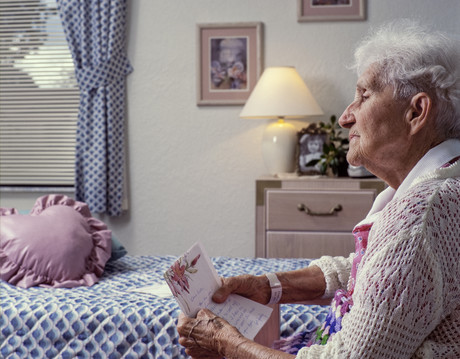There's no need to lock older people into nursing homes 'for their own safety'
By Marta Woolford, Monash University and Joseph Ibrahim, Monash University
Wednesday, 22 March, 2017

Older people in nursing homes or aged care facilities are often locked up “for their own safety”. But our review shows there’s in most cases for this unfair and unreasonable practice. 
In most cases, the chance of older people harming themselves is minimal, so there is no justification for denying them the right to move freely. What can families, facility managers and governments do to give older people back that right?
Wanderers, absconders and elopers
We rationalise locking nursing home doors by arguing that residents are old and frail, don’t know what they are doing, and will otherwise get lost and harm themselves. So, walking out of a nursing home unaccompanied and without telling caregivers is seen as a high-risk activity to be prevented at all costs.
Restraining methods include installing , using , as well as and interventions.
Residents who try to leave unaccompanied and without telling anyone are called “wanderers”, “absconders” or “elopers”. And if people wander, abscond or elope, this counts as an “unexplained absence”.
Unexplained absences happen more often than we realise, with to of US residents living in assisted living or nursing homes reported missing at some time. There is no published data on the proportion of unexplained absences in Australia.
While these absences might be common, our review suggests they might at best as people think, or at worst, we just don’t have the evidence to tell us how dangerous they are.
Our analysis of nine studies showed most people left by foot, and were found in green vegetation and waterways within 1.6km of the place where they were last seen.
A total of 61 people were injured for every 1000 people with an unexplained absence. And 82 people died for every 1000 people leaving, with extreme temperatures the most common cause of death.
While these figures might sound high, they are likely an overestimate, as unexplained absences from nursing homes were lumped in with those from people living at home in the community.
Also, all of the studies looked at people with dementia, a for unexplained absence, which may have further overestimated the proportion of people who die after an unexplained absence. This means the high number of deaths doesn’t represent all nursing home residents, who have different and varying levels of cognitive and physical impairment.
Aren’t there really good reasons for protecting vulnerable people?
There are some to confine a very small number of older people in nursing homes, such as those with severe behavioural issues due to mental health problems, who maybe disorientated and delusional. Some residents also feel more secure if doors are locked.
Once outside, some residents, especially those with cognitive and physical impairments, could enter unsafe areas and be harmed.
So, it’s no wonder the issue of “to lock or not” poses challenges for the care provider when trying to balance safety with independence. Another factor is that support staff might need to help residents get out and about, placing time pressures on their already tight schedules.
Nursing homes might not also want to, or be unable to, carry the cost of providing care that supports residents leaving when they want to.
Balancing risks with benefits
Which is worse, the psychological impact of being locked in versus the physical risk of leaving? Given we know very little about how many residents die or are injured from an “unexplained absence”, how can we be sure the risk is greater outside the facility?
How much of our concern for safety is for the resident, how much is for the family members and caregivers, and how much of it is for the staff and owners of nursing homes?
People who have family members in a nursing home should be asking whether locking up a person in the final stage of their life is really what is best for them. Family members should be encouraging the nursing home to support their family member to have independence, autonomy and control over their life.
The aged care sector also needs to challenge the ingrained belief its role is to keep residents safe and free from harm.
Nursing homes’ fear of losing their reputation, accreditation and receiving sanctions is real, and so it’s not surprising physical safety takes precedent over freedom of movement.
While nursing home providers are rewarded for running a safe facility, a way forward should be to reward them for how they support residents to be independent.
A growing concern
The issue of locking up nursing home residents will become as the population ages. And living in an aged care facility may become inevitable for many elderly people, especially for those with progressive such as dementia.
But a nursing home is not a place of incarceration, and for most, it’s people’s final home. We should be less fearful of autonomy and independence. After all, people living in their own home in the community happily practice autonomy every day, even if it brings with it risk.
We worry so much about what can go wrong, we rarely stop to consider how often it turns out OK.
, PhD Candidate and Research Officer at the Department of Forensic Medicine, and , Professor, Health Law and Ageing Research Unit, Department of Forensic Medicine,
This article was originally published on . Read the .
Originally published
Raising 'tech neck' awareness this Spinal Health Week
For Spinal Health Week, 26 May–1 June, the Australian Chiropractors Association has...
New Aged Care Act: six things providers need to know
On 1 November, the new Aged Care Act comes into effect, marking once-in-a-generation reforms. A...
A Day in the Life of a rehabilitation physician and burnout coach
Dr Jo Braid is a rehabilitation physician and coach dedicated to transforming burnout recovery...





